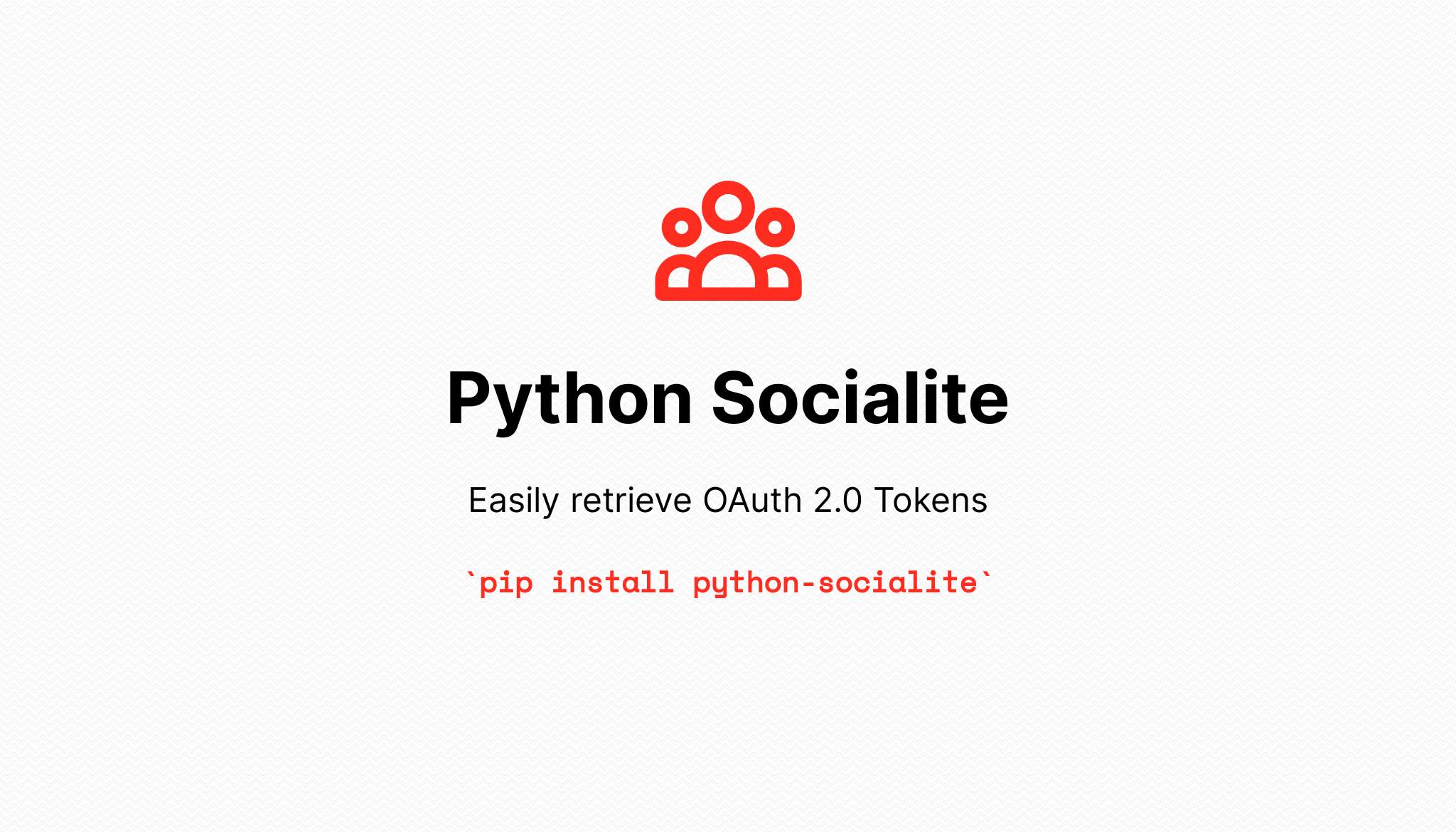Simple Python oAuth Login
Project description
python-socialite

The easy way to retrieve OAuth 2.0 Tokens from any provider
Simple and convenient way for fetching OAuth 2.0 tokens from any provider. Out of the box support for Facebook, Google, GitHub, Microsoft, Bitbucket and more coming... Inspired by Laravel Socialite
This package handles all required boilerplate code for implementing OAuth based social authentication in Python and allows you to integrate OAuth login easily in any app built with Python irrespective of your python framework or platform.
Features
- Supports multiple common providers
- Supports any oAuth 2 compliant providers (You can provide a custom driver)
- Straighforward unopinionated authentication
- Can be implemented in any python framework
Out of the box OAuth 2.0 Social Login Providers
- Login with Facebook
- Login with Google
- Login with Microfost
- Login with Github
- Login with Bitbucket
- Any custom OAuth 2.0 driver
Usage
Installation
pip install python-socialite
Generate redirect uri
from python_socialite import OAuthProvider
config = {
"google": {
"client_id": "",
"client_secret": "",
"redirect_url": ""
},
"microsoft": {
"client_id": "",
"client_secret": "",
"redirect_url": "",
"tenant": "common",
"scopes": ["email", "user"],
}
}
# Authorize Google
provider = OAuthProvider("google", config)
redirect_url = provider.get_auth_url()
# Authorize Microsoft
provider = OAuthProvider("microsoft", config)
redirect_url = provider.get_auth_url()
# redirect user to the redirect_url using your frameworks supported redirect
Retrieving Access Token and User
code = "" # OAuth provider will redirect back to your redirect_url with a code in the url
provider = OAuthProvider("google", config)
token = provider.get_token(code)
user = provider.get_user(token["access_token"])
This package does not provide opinion on how you use the returned token or user profile. Add that to your application's business logic. Examples include hooking up to your authentication logic, fetching data associated with the returned access token e.t.c
Token Template
NB: Token attributes might vary between providers. Here's a sample returned by Google oAuth
{
"access_token": "ya29.***",
"expires_in": 3599,
"scope": "https://www.googleapis.com/auth/userinfo.profile openid",
"token_type": "Bearer",
"id_token": "***jwt***"
}
User Template
user = {
"id": "",
"name": "",
"email": "",
"avatar": "",
"raw": "",
"provider": ""
}
The raw attribute contains all user data as returned by the oAuth provider. Fields in this attribute can be different across different oAuth providers
Requesting Scopes
By default the following scopes are requested
openid, email, profile
You can override requested scopes by adding them to the provider config or using set_scopes method
provider = OAuthProvider("google", config)
auth_url = provider.set_scopes(["openid", "email", "profile"]).get_auth_url()
NB: If no scopes are set in the config or in code the default scopes will be used
Config Options
The config must be a dict containing keys of any of the supported providers
# each provider key must have client_id, client_secret and redirect_url. It's advised to ensure your client_secret is properly secured
config = {
"google": {
"client_id": "",
"client_secret": "",
"redirect_url": "",
"scopes": [] # optional
},
"facebook": {},
"github": {},
"microsoft": {},
}
Points to note
- Facebook now requires an access token to load user profile picture. If token is not supplied a placeholder will be returned.
- Github does not always return users emails depending on user's privacy settings. In that case an
@users.noreply.github.comemail will be returned. - Microsoft does not return a picture in the users profile. You can use the returned access token to fetch one from Microsoft Open Graph
- Support for adding a custom driver to any OAuth provider of your choice is planned. If you urgently need this open an issue
- The Bitbucket driver will make two calls in order to fetch the user's email addresses
- The Bitbucket driver does not fetch the user's profile pic
Building custom OAuth 2.0 login driver in python
You can build your own custom OAuth 2.0 driver for any of your preferred services by extending AbstractDriver
TIP: copy code from one of the other drivers on the src directory and modify where necessary
from python_socialite.drivers.abstract_driver import AbstractDriver
class AcmeProvider(AbstractDriver):
def __init__(self, config):
"""Initialize Acme provider."""
super().__init__(config)
self.scopes = config.get("scopes", ["account", "email"])
@staticmethod
def provider_name():
return "acme" # config key
Have a look at the exiting drivers for methods that you must implment
Calling your custom driver
Create your config
config = {
"acme": {
"client_id": "xxxxxxxxxxxxxxxx",
"client_secret": "xxxxxxxxxxxx",
"redirect_url": "http://localhost"
},
}
provider = OAuthProvider(AcmeProvider, config)
NB: Call all other methods as ussual
Project details
Download files
Download the file for your platform. If you're not sure which to choose, learn more about installing packages.
Source Distribution
Built Distribution
Hashes for python_socialite-1.1.1-py3-none-any.whl
| Algorithm | Hash digest | |
|---|---|---|
| SHA256 | 84282f2778fe47608c9880fc4537a380c33c7725f3bd0244c2ec400d2471ae3f |
|
| MD5 | cb49114885356edaf11597aace8defe5 |
|
| BLAKE2b-256 | c420af1901939486b62e9aca707c25eefce8ac5fa0c3405ef998913adad331ba |















